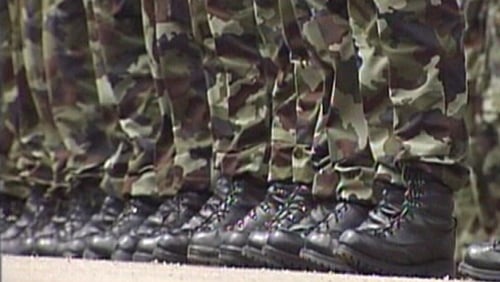
Defence Forces 'may never return to intended strength'
by Ingrid Miley, https://www.facebook.com/rtenews/The body representing Defence Forces Officer grades has warned that if immediate, significant retention initiatives are not implemented, the Defence Forces will not only never return to its target strength of 9,500, but will continue to decline.
The Representative Association of Commissioned Officers (RACO) issued the warning in a briefing document for Oireachtas members.
RACO focuses on the staff recruitment and retention crisis in the Defence Forces, noting that despite Government commitments to boost numbers, they have fallen to an all-time low of 8,485 due to an "unsustainably high" staff turnover rate of 10.5% last year.
At the end of April, the Army had 6,867 members, the Naval Service had 892, while the Air Corps had 726.
In 2019, 870 Defence Forces members left the service, while 605 joined - a net loss of 265.
There are currently 1,015 vacancies, up from 327 at the end of 2017.
"This is a result of well documented poor conditions of service, low rates of pay and is despite the much-publicised report of the Public Service Pay Commission, and the associated restoration of some allowances that had been cut by the Haddington Road Agreement and a modest increase of 10% in Military Service Allowance," the RACO briefing document states.
RACO warns that Covid-19 restrictions including social distancing will exacerbate matters, as they will significantly affect the ability to conduct induction training in the short to medium term.
RACO criticises the publication last Friday of the Parliamentary Budget Office (PBO) paper on recruitment, retention and remuneration in the the Defence Forces, saying it had relied on the use of an outdated data up to 2017 to brief Oireachtas members.
Analysing the high level of Defence Forces staff turnover, the PBO had blamed factors including "unrealistic expectations of military life, more attractive options outside of the military, the perceived person-environment fit and quality of life in the military."
RACO goes on to allege that the Government's latest High Level Implementation Plan 'Strengthening Our Defence Forces' is not being implemented quickly enough, with eight out of the 15 projects "significantly behind schedule", and further claims that the Programme Management Office staff tasked with executing this plan having been reassigned by management.
As recently as last week, the Minister with Responsibility for Defence Paul Kehoe pledged to restore the Defence Forces to a minimum strength of 9,500 personnel.
However, RACO cites figures showing that even if an "ambitious" target of 700 recruits per year were met, with the current "unsustainable" turnover rate of 10%, the Defence Forces will never return to its minimum intended strength of 9,500, and its numbers will actually continue to decline.
It says that if the staff turnover rate could be reduced to 5%, and with 700 inductions per year, the Defence Forces could reach 9,500 by 2023, adding: "This is achievable with the political will."
It criticises recent pay awards as being inadequate, and worth as little as 96c per day for a private soldier.
The RACO report reiterates the organisation's demand for an immediate Independent Pay Review Body "to recognise the unique nature of military service, and ensure that its personnel are not exploited for their refusal to take industrial action".
It is also seeking a Commission on the Future of Defence to tackle issues including inadequate pension provision, the failure to implement the EU Working Time Directive, and the recent topical lack of strategic air lift for Defence Forces' troops and logistics.